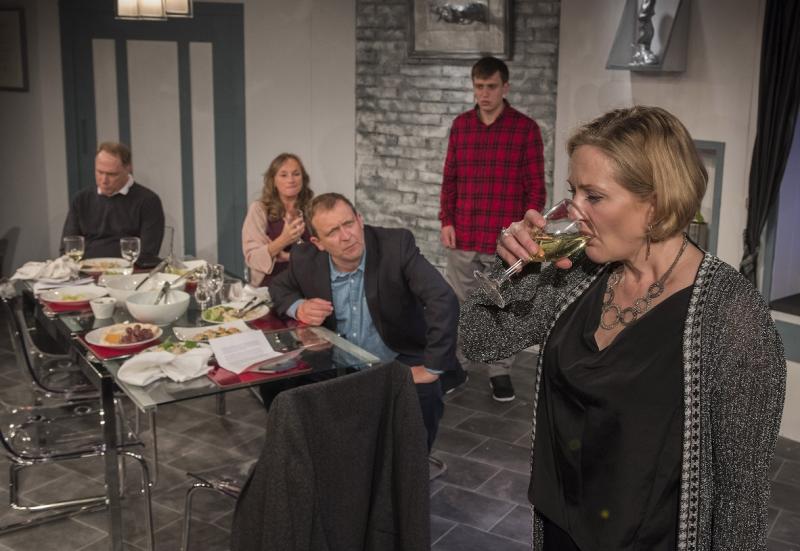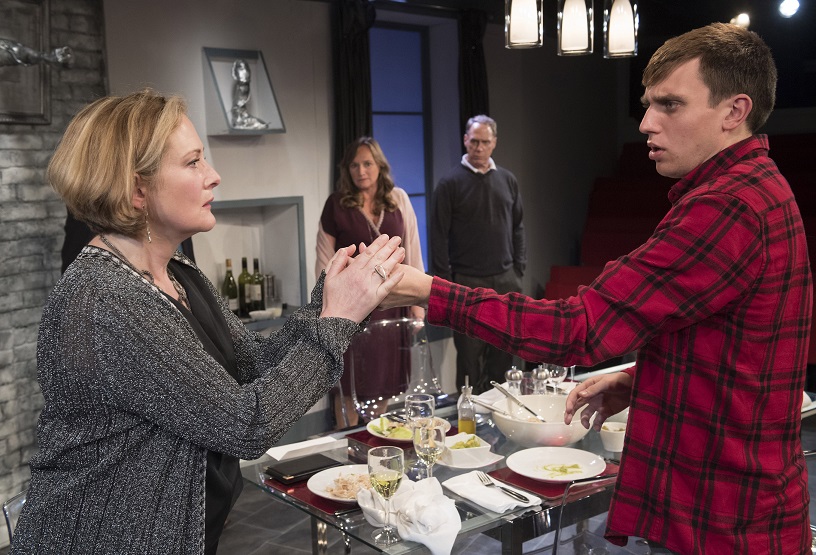Late Company, Trafalgar Studios review - visceral production of Jordan Tannahill's lean, pained drama | reviews, news & interviews
Late Company, Trafalgar Studios review - visceral production of Jordan Tannahill's lean, pained drama
Late Company, Trafalgar Studios review - visceral production of Jordan Tannahill's lean, pained drama
Family trauma stripped back to the barest bones

Canadian playwright Jordan Tannahill wrote Late Company when he was only 23. It would be an impressive achievement at any age, but it seems all the more remarkable that so stark a dissection of the consequences of a tragedy should have come from so young a writer. Written in 2013, it was his fifth play.
Tannahill has said that its inspiration came from a real-life incident in his hometown, Ottawa, and that he had originally meant to write it more for himself, and perhaps a group of friends – as a kind of internal reckoning. But he has gone far beyond that: the skill and tightness of the writing – Late Company lasts a bare 75 minutes – makes for an impressive emotional intensity.
This won’t be any ordinary evening of entertaining
Tannahill leads us into the story conventionally, as a couple prepare for dinner guests. Debora (Lucy Robinson) and Michael (Todd Boyce) are from an upper-crust Toronto world: she’s an artist, her metal sculptures adorning the walls of the apartment, while he is a successful Conservative politician. But it quickly becomes clear this won’t be any ordinary evening of entertaining of the sort they are clearly accustomed to. It’s a year on from the suicide of their teenage son, Joel, and the guests tonight are the parents of one of the boys whose bullying contributed to Joel’s death, Bill (Alex Lowe) and Tamara (Lisa Stevenson). They are coming with their son, Curtis (David Leopold), a high school contemporary of the dead boy, who been one of those adding cruel comments to Joel's social media pages. They had picked on Joel for his being gay, and the flamboyance of his behaviour.
An empty place at the table is set for Joel, whom we assume is the “late company” of the title. Tannahill charts the development of the two couple's developing interaction unforgivingly, how the desperate niceties of arrival and small talk give way, as they sit down to dinner, to a full release of feelings. It’s not exactly what we know as restorative justice, more an attempt at some sort of catharsis, perhaps to give the grieving parents something like a first step towards closure. Rather quickly it becomes clear that any such expectations are not going to be fulfilled. (Lucy Robinson, David Leopold, pictured below)
 Confrontation in an enclosed space is an elemental feature of theatre, of course. It’s stoked here by the fact that part of the agenda for the night involves reading letters written by Debora and by Curtis. They leave the assembled company, and the audience, in agonised silence, the emotional power of Debora’s missive simply spellbinding. But in the process Tannahill makes it clear than though a sharing of grief may be nominally on the agenda, Debora is not ready for anything like forgiveness: she remains trapped in a dark place, intent on cementing the blame all over again.
Confrontation in an enclosed space is an elemental feature of theatre, of course. It’s stoked here by the fact that part of the agenda for the night involves reading letters written by Debora and by Curtis. They leave the assembled company, and the audience, in agonised silence, the emotional power of Debora’s missive simply spellbinding. But in the process Tannahill makes it clear than though a sharing of grief may be nominally on the agenda, Debora is not ready for anything like forgiveness: she remains trapped in a dark place, intent on cementing the blame all over again.
She may channel accusatory anger, but at the same time she’s forced to confront the realisation of just how little she had known about her son. She had never taken on board many small details of his life (and death), even some known to her husband. “How much I never knew,” she laments late on, and the gaps in that knowledge will be filled in painfully.
Tannahill also conveys a sense that, for all the self-knowledge they are acquiring, Debora and Michael also suffer from a considerable degree of self-satisfaction. They had surely planned the evening, expecting to control its result. We come to appreciate the nuances of social difference between the two couples, and the “simplicity” of the visitors makes them rather more sympathetic when set against the studied self-confidence of the hosts.
This production is a transfer from the Finborough Theatre where it played in the Spring, and the Trafalgar Studios’ confined second space suits it wonderfully. The cast is excellent, Lucy Robinson as Debora outstanding as we come to appreciate the chasm between her social niceties and her aching grief as a mother. David Leopold as Curtis is remarkable too, his ungainly physical presence and lack of fluency of expression speaking more powerfully than any words could. We’re sure to be hearing more of Tannahill’s name: what a powerful piece of drama this is, its pained leanness immaculately caught in Michael Yale’s production.
rating
Explore topics
Share this article
The future of Arts Journalism
You can stop theartsdesk.com closing!
We urgently need financing to survive. Our fundraising drive has thus far raised £49,000 but we need to reach £100,000 or we will be forced to close. Please contribute here: https://gofund.me/c3f6033d
And if you can forward this information to anyone who might assist, we’d be grateful.

Subscribe to theartsdesk.com
Thank you for continuing to read our work on theartsdesk.com. For unlimited access to every article in its entirety, including our archive of more than 15,000 pieces, we're asking for £5 per month or £40 per year. We feel it's a very good deal, and hope you do too.
To take a subscription now simply click here.
And if you're looking for that extra gift for a friend or family member, why not treat them to a theartsdesk.com gift subscription?
more Theatre
 Wendy & Peter Pan, Barbican Theatre review - mixed bag of panto and comic play, turned up to 11
The RSC adaptation is aimed at children, though all will thrill to its spectacle
Wendy & Peter Pan, Barbican Theatre review - mixed bag of panto and comic play, turned up to 11
The RSC adaptation is aimed at children, though all will thrill to its spectacle
 Hedda, Orange Tree Theatre review - a monument reimagined, perhaps even improved
Scandinavian masterpiece transplanted into a London reeling from the ravages of war
Hedda, Orange Tree Theatre review - a monument reimagined, perhaps even improved
Scandinavian masterpiece transplanted into a London reeling from the ravages of war
 The Assembled Parties, Hampstead review - a rarity, a well-made play delivered straight
Witty but poignant tribute to the strength of family ties as all around disintegrates
The Assembled Parties, Hampstead review - a rarity, a well-made play delivered straight
Witty but poignant tribute to the strength of family ties as all around disintegrates
 Mary Page Marlowe, Old Vic review - a starry portrait of a splintered life
Tracy Letts's Off Broadway play makes a shimmeringly powerful London debut
Mary Page Marlowe, Old Vic review - a starry portrait of a splintered life
Tracy Letts's Off Broadway play makes a shimmeringly powerful London debut
 Little Brother, Soho Theatre review - light, bright but emotionally true
This Verity Bargate Award-winning dramedy is entertaining as well as thought provoking
Little Brother, Soho Theatre review - light, bright but emotionally true
This Verity Bargate Award-winning dramedy is entertaining as well as thought provoking
 The Unbelievers, Royal Court Theatre - grimly compelling, powerfully performed
Nick Payne's new play is amongst his best
The Unbelievers, Royal Court Theatre - grimly compelling, powerfully performed
Nick Payne's new play is amongst his best
 The Maids, Donmar Warehouse review - vibrant cast lost in a spectacular-looking fever dream
Kip Williams revises Genet, with little gained in the update except eye-popping visuals
The Maids, Donmar Warehouse review - vibrant cast lost in a spectacular-looking fever dream
Kip Williams revises Genet, with little gained in the update except eye-popping visuals
 Ragdoll, Jermyn Street Theatre review - compelling and emotionally truthful
Katherine Moar returns with a Patty Hearst-inspired follow up to her debut hit 'Farm Hall'
Ragdoll, Jermyn Street Theatre review - compelling and emotionally truthful
Katherine Moar returns with a Patty Hearst-inspired follow up to her debut hit 'Farm Hall'
 Troilus and Cressida, Globe Theatre review - a 'problem play' with added problems
Raucous and carnivalesque, but also ugly and incomprehensible
Troilus and Cressida, Globe Theatre review - a 'problem play' with added problems
Raucous and carnivalesque, but also ugly and incomprehensible
 Clarkston, Trafalgar Theatre review - two lads on a road to nowhere
Netflix star, Joe Locke, is the selling point of a production that needs one
Clarkston, Trafalgar Theatre review - two lads on a road to nowhere
Netflix star, Joe Locke, is the selling point of a production that needs one
 Ghost Stories, Peacock Theatre review - spirited staging but short on scares
Impressive spectacle saves an ageing show in an unsuitable venue
Ghost Stories, Peacock Theatre review - spirited staging but short on scares
Impressive spectacle saves an ageing show in an unsuitable venue
 Hamlet, National Theatre review - turning tragedy to comedy is no joke
Hiran Abeyeskera’s childlike prince falls flat in a mixed production
Hamlet, National Theatre review - turning tragedy to comedy is no joke
Hiran Abeyeskera’s childlike prince falls flat in a mixed production

Add comment